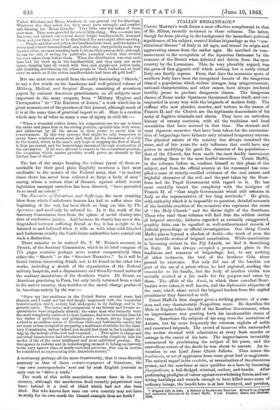ITALIAN BRIGANDAGE.*
COUNT MAFFEI'S work forms a most effective complement to that of Mr. Hilton, recently reviewed in these columns. The latter, though far from placing in the background the immediate political significance of his subject, treated Italian brigandage as the "con- stitutional disease" of Italy in all ages, and traced its origin and aggravating causes from the earlier ages. He ascribed its com- mencement to the occupation of the Apennine fastnesses by the remnant of the Bruttii when defeated and driven from the open country by the Lucanians. This, he very plausibly argued, was the germ of that gigantic evil which nothing but a really united Italy can finally repress. From that date the mountain spurs of southern Italy have been the recognized haunts of the dangerous class of a population which violent changes, long misgovernment, national characteristics, and other causes, have always rendered terribly prone to produce dangerous classes. The dangerous classes of Rome under Spartacus threatened Rome itself, and cor- responded in every way with the brigands of modern Italy. The ruffians who now plunder, murder, and torture in the names of Francis H. and the Church are the legitimate descendants of his army of fugitive criminals and slaves. They have an unbroken history of twenty centuries, with all the traditions and local association that have accrued in that time. The sternest and most vigorous measures that have been taken for the extermina- tion of brigandage have hitherto only attained temporary success_ The physical nature of the country has always remained the same, and of late years the only influence that could have any power in modifying for good the character of the population—. that of the Church, has been made the most deadly instrument for exciting them to the most fearful atrocities. Count Maffei, in the volumes before us, confines himself to this phase of the subject, and from the official sources at his command has com- piled a mass of strictly-verified evidence of the real extent and frightful character of the evil, and the part taken by the Bour- bons and the Papal Government with regard to it. He has most carefully traced the complicity with the intrigues of Francis II. of "that single Government which still remains in Italy as the representative of her long servitude." He gives, with authority which it is impossible to question, detailed accounts of the horrible cruelties of the monsters who represent the cause of "the Holy Church" and the divine right of the Bourbons. Those who read these volumes will find that the wildest stories of brigand atrocity, hitherto regarded as certainly exaggerated, possibly false, can be equalled in well-authenticated records of judicial proceedings or official investigations. One thing Count Maffei places beyond a shadow of doubt—the truth of even the most horrible stories of brigand cannibalism. While cannibalism. is becoming extinct in the Fiji Islands, we find it flourishing in Italy. It has always occupied a prominent place in the traditions and romance of brigandage, but, to say nothing of other instances, the trial of the brothers Gala alone proved its existence. Not only did one of the bandits eat part of the ear of a priest whom he had captured, sending the remainder to his family, but the body of another victim was actually roasted at a fire made for the purpose and eaten by them. The affair of the Aunis, in which these cannibal Bour- bonists were taken,is well known, and the diplomatic etiquette of the case, which alone saved the brigand leaders from the capital punishment they deserved so well.
Count Maffei's first chapter gives a striking picture of a com- mon and very characteristic Neapolitan scene. He describes the Mole at Naples before the fall of the Bourbon Government, when an improvisatore was pouring forth his inexhaustible stores of verse. Sometimes the subjects of his song were the narratives of Ariosto, but far more frequently the valorous exploits of noble and renowned brigands. The crowd of lazzaroni who surrounded the reciter shouted with admiration at every fresh murder or outrage in the career of his hero. The improvisatore invariably commenced by proclaiming the subject of his poem, and the marvellous nature of the deeds he was about to narrate. An in- vocation to our Lord Jesus Christ follows. Then comes the tradimento, or act of oppression from some great lord or magistrate. The natural sequel is the vendetta, or assassination of the obnoxious person, and the murderer at once qualifies as a hero by becoming frorgiudicato, a full-fledged criminal, outlaw, and bandit. After performing prodigies of valour against overwhelming forces, and sur- viving hardships and wounds enough to have killed some score of ordinary beings, the bandit hero is at last betrayed, and perishes,
* Brigand We in Italy. A History of Bourbonian Reaction. Edited frail Original and Authentic I:We:meats by Count Maffei. 2 vols. Loudon: Hurst and Hisokett. 1885. according to the poet, amidst the joy of the soldiers and the tears of the people. This is the almost uniform course of the thousand ballads which delighted the frequenters of the Mole at Naples. To them a bandit was not a malefactor, but rather "a romantic being in a false position," like the corsairs of Byron. The notion that brigandage is an honourable profession has taken deep root in the Neapolitan mind. A story is related by Stendral, of a Neapolitan prefect and a peasant whom he pressed for some fifteen ducats taxes which were overdue. The man's excuse was the very common one of "hard times." But his idea of what hard times were would seem strange in any country but Naples under the old regime. "What can I do ? There is nothing doing on the high road. I am out on it every day with my gun, but no one passes it. I promise, however, to go out every evening until I have picked up the fifteen ducats you want."
The main value of Count Maffei's work is, however, its com- pleteness as a record of brigandage since 1859, its connection with Rome, the measures taken for its repression, and the prospects of its ultimate extermination. With regard to the latter, the recent affair at Salerno has uncomfortably undeceived the too sanguine. But Count Maffei, in his account of the military operations against the brigands, expressly mentions the existence of several bands -whose inaccessible mountain haunts would, it was to be feared, secure them from the soldiers until winter rendered them unten- able. But mere military repression of brigandage is only a sur- gical operation, which cannot succeed unless aided by powerful medicinal remedies. Railways, roads, education, and the increase of demand for labour caused by the influx of capital and by public improvements, are all tending to undermine the real causes of the evil. The great interchange of the northern and southern populations—there being no less than 20,000 Neapolitans in Turin at the last census—is bringing about most beneficial results. Careful statistics show that brigandage has always prevailed most extensively in districts where education has been most neglected. There are now more than fifty schools supported by the munici- pality in Naples, and sixteen evening institutions, where Nea- politan workmen in many cases learn to read and write, and become satisfactorily acquainted with the metric and decimal systems, in the short space of two months. Roads are being cut in every direction through the forests which still give brigands security and shelter, and just in proportion as cub tivation diminishes the area of forest and moor are the refuges of the brigands cut off. With regard to the purely military opera- tions against brigands Count Maffei gives the following statistics :— From the 1st of May, 1861, to the end of March, 1863, 21 offi- cers and 286 soldiers were killed, and 86 wounded. This has been a frightful loss, when the savage tortures undergone by so many of them are borne in mind. During the same period 3,451 brigands have been killed and 2,768 made prisoners, while 982 have given themselves up. No less than 7,151 have therefore been put hors de combat by death, capture, or surrender. While the conditions that furnish recruits are steadily being sapped, the actual brigand force must at this rate be on the point of destruction, notwith- standing the support of an ex-King and the blessing of the mori- bund Papacy.































 Previous page
Previous page